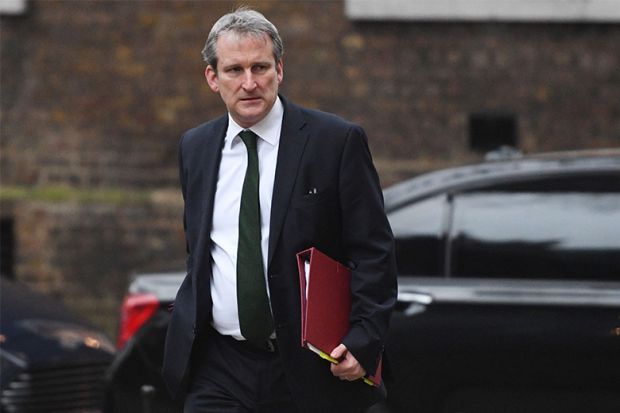Damian Hinds, the UK’s education secretary, is planning a series of “interventions” on grade inflation, essay mills and unconditional offers, in a move seen as being linked to the government’s ongoing review of English post-18 education.
Mr Hinds had been near-silent on higher education policy since his appointment in January 2018. The first of the announcements, billed within government as “interventions”, had been scheduled for 11 March. Although this announcement was pulled at the last minute, it is thought that the series will go ahead at a later date.
Mr Hinds’ expected announcements appear to be being developed without the input of Chris Skidmore, the universities minister.
Mr Skidmore has openly opposed the idea of setting a minimum tariff for student loan access, expected to be one of the key recommendations from the review panel, being led by Philip Augar. The universities minister has also adopted a sympathetic stance towards universities by calling for the review’s recommendations – expected to include a cut in tuition fees and potentially in funding – to be “tested with the sector”. The alternative feared by some is the Treasury packaging the post-18 review as part of its spending review, leaving no scope for consultation.
Mr Hinds may be seeking to take back control of the Department for Education’s stance on higher education and the review from his more junior colleague. His “interventions” could be about building the case for the review to shift funding from higher education to further education – and potentially about building a case for the reintroduction of student number controls.
With Brexit dominating, No 10 could also be keen to offer more on the domestic agenda and offer apparent developments on higher education policy in the absence of post-18 review progress.
The review will not be published while the government remains occupied by the Brexit crisis, it is thought. A May publication date is expected by some, but it remains to be seen whether that could be impacted by a delay in the UK’s scheduled departure date from the European Union.
Nick Hillman, director of the Higher Education Policy Institute, suggested that No 10 could be driving the planned announcements, after “beginning to realise” that the post-18 review process will be “a lot longer and slower and harder to implement” than it initially expected – particularly after Labour, which wants to abolish fees, said that it was likely to vote against merely lowering fees.
Mr Hinds will be more minded “to push Augar through”, in contrast to the “very sector-friendly” stance of the past few universities ministers, including Mr Skidmore, Mr Hillman added.
However, the education secretary recently said that higher tuition fees have not deterred disadvantaged young people from entering higher education – seeming to take a supportive stance towards the £9,250 fee system.
后记
Print headline: Is no. 10 taking back control?




